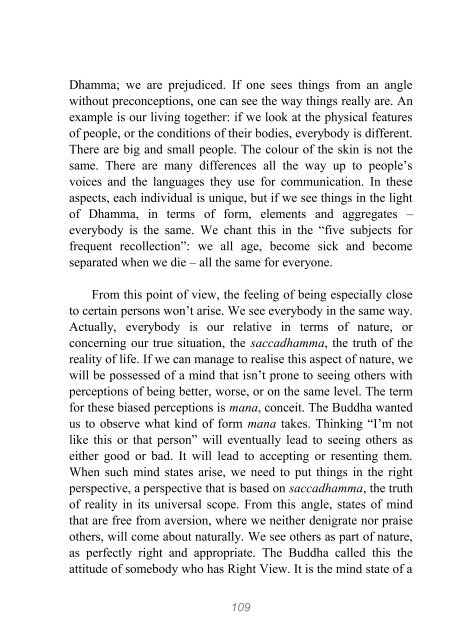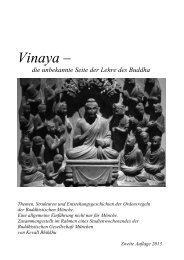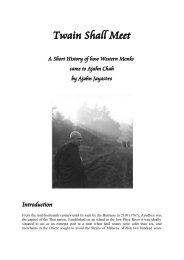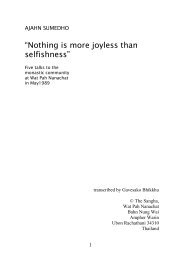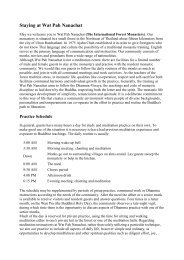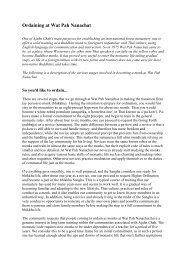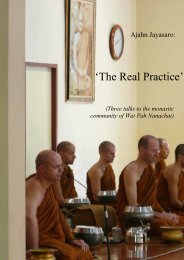Luang Por Liem: The Ways of the Peaceful - Wat Pah Nanachat
Luang Por Liem: The Ways of the Peaceful - Wat Pah Nanachat
Luang Por Liem: The Ways of the Peaceful - Wat Pah Nanachat
Create successful ePaper yourself
Turn your PDF publications into a flip-book with our unique Google optimized e-Paper software.
Dhamma; we are prejudiced. If one sees things from an angle<br />
without preconceptions, one can see <strong>the</strong> way things really are. An<br />
example is our living toge<strong>the</strong>r: if we look at <strong>the</strong> physical features<br />
<strong>of</strong> people, or <strong>the</strong> conditions <strong>of</strong> <strong>the</strong>ir bodies, everybody is different.<br />
<strong>The</strong>re are big and small people. <strong>The</strong> colour <strong>of</strong> <strong>the</strong> skin is not <strong>the</strong><br />
same. <strong>The</strong>re are many differences all <strong>the</strong> way up to people’s<br />
voices and <strong>the</strong> languages <strong>the</strong>y use for communication. In <strong>the</strong>se<br />
aspects, each individual is unique, but if we see things in <strong>the</strong> light<br />
<strong>of</strong> Dhamma, in terms <strong>of</strong> form, elements and aggregates –<br />
everybody is <strong>the</strong> same. We chant this in <strong>the</strong> “five subjects for<br />
frequent recollection”: we all age, become sick and become<br />
separated when we die – all <strong>the</strong> same for everyone.<br />
From this point <strong>of</strong> view, <strong>the</strong> feeling <strong>of</strong> being especially close<br />
to certain persons won’t arise. We see everybody in <strong>the</strong> same way.<br />
Actually, everybody is our relative in terms <strong>of</strong> nature, or<br />
concerning our true situation, <strong>the</strong> saccadhamma, <strong>the</strong> truth <strong>of</strong> <strong>the</strong><br />
reality <strong>of</strong> life. If we can manage to realise this aspect <strong>of</strong> nature, we<br />
will be possessed <strong>of</strong> a mind that isn’t prone to seeing o<strong>the</strong>rs with<br />
perceptions <strong>of</strong> being better, worse, or on <strong>the</strong> same level. <strong>The</strong> term<br />
for <strong>the</strong>se biased perceptions is mana, conceit. <strong>The</strong> Buddha wanted<br />
us to observe what kind <strong>of</strong> form mana takes. Thinking “I’m not<br />
like this or that person” will eventually lead to seeing o<strong>the</strong>rs as<br />
ei<strong>the</strong>r good or bad. It will lead to accepting or resenting <strong>the</strong>m.<br />
When such mind states arise, we need to put things in <strong>the</strong> right<br />
perspective, a perspective that is based on saccadhamma, <strong>the</strong> truth<br />
<strong>of</strong> reality in its universal scope. From this angle, states <strong>of</strong> mind<br />
that are free from aversion, where we nei<strong>the</strong>r denigrate nor praise<br />
o<strong>the</strong>rs, will come about naturally. We see o<strong>the</strong>rs as part <strong>of</strong> nature,<br />
as perfectly right and appropriate. <strong>The</strong> Buddha called this <strong>the</strong><br />
attitude <strong>of</strong> somebody who has Right View. It is <strong>the</strong> mind state <strong>of</strong> a<br />
109


